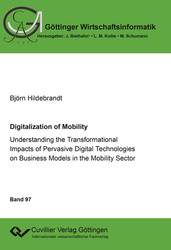| Fachbereiche | |
|---|---|
| Buchreihen (97) |
1381
|
| Nachhaltigkeit |
3
|
| Gesundheitswesen |
1
|
| Geisteswissenschaften |
2370
|
| Medienwissenschaften | 16 |
| Theologie | 57 |
| Philosophie | 102 |
| Rechtswissenschaft | 423 |
| Wirtschaftswissenschaften | 852 |
| Sozialwissenschaften | 417 |
| Sportwissenschaften | 48 |
| Psychologie | 233 |
| Pädagogik | 190 |
| Geschichtswissenschaften | 183 |
| Kunstwissenschaften | 111 |
| Kulturwissenschaften | 166 |
| Literaturwissenschaften | 117 |
| Sprachwissenschaften | 88 |
| Naturwissenschaften |
5407
|
| Ingenieurwissenschaften |
1798
|
| Allgemein |
98
|
|
Leitlinien Unfallchirurgie
5. Auflage bestellen |
|
Erweiterte Suche
Digitalization of Mobility (Band 97)
Understanding the Transformational Impacts of Pervasive Digital Technologies on Business Models in the Mobility Sector
Björn Hildebrandt (Autor)Vorschau
Leseprobe, PDF (750 KB)
Inhaltsverzeichnis, PDF (580 KB)
The ongoing diffusion of digital technologies heralds a major change in the mobility domain as it helps to unearth significant opportunities for the reorganization of socio-technical arrangements that have existed for decades. In this light, both scholars and practitioners have begun to investigate the novel opportunities and challenges confronting the mobility
sector.
This cumulative thesis, composed of five individual studies, aspires to provide a comprehensive understanding of the transformational impacts of pervasive digital technologies on business models in the mobility sector. Employing a multi-level perspective, this thesis focuses on three main objectives:
(1) shedding light on the nature of digitalization and its impacts on business models in general terms, (2) exploring changes in incumbent mobility firms’ business models in response to the increased diffusion of digital technologies, and (3) examining the potentials of digital technologies to improve value creation and capture in disruptive mobility business models.
The findings underline that digitalization is not only concerned with technical aspects but is rather a socio-technical process of applying digital technologies to broader institutional and social contexts. Due to the diversity of technologies and actors involved, digitalization has evolved into an overarching phenomenon that is beyond the control of single actors and affects changes in firms’ business models through diverse mechanisms. In addition, this thesis describes how incumbent mobility firms adapt their business models in light of consumers’ changing preferences and how they source the knowledge necessary to develop
innovations that build upon hybrid combinations of physical and digital components.
Finally, the thesis elaborates on the capacity of digital technologies to facilitate the rise of disruptive mobility business models by improving their attractiveness for both consumers and providers.
The crucial success factor is compatibility with the surrounding digital eco-systems, thus rendering it imperative to co-create and co-capture value with diverse actors, including partners, competitors, and customers. From the findings, this thesis derives valuable implications for both research and practice.
| ISBN-13 (Printausgabe) | 9783736998278 |
| ISBN-13 (E-Book) | 9783736988279 |
| Buchendformat | A5 |
| Sprache | Englisch |
| Seitenanzahl | 210 |
| Umschlagkaschierung | glänzend |
| Auflage | 1. |
| Buchreihe | Göttinger Wirtschaftsinformatik |
| Band | 97 |
| Erscheinungsort | Göttingen |
| Promotionsort | Göttingen |
| Erscheinungsdatum | 10.07.2018 |
| Allgemeine Einordnung | Dissertation |
| Fachbereiche |
Wirtschaftswissenschaften
Informatik |
| Schlagwörter | Digitalization, Digital Technolgies, Mobility, Digital Innovation, Business Model |








